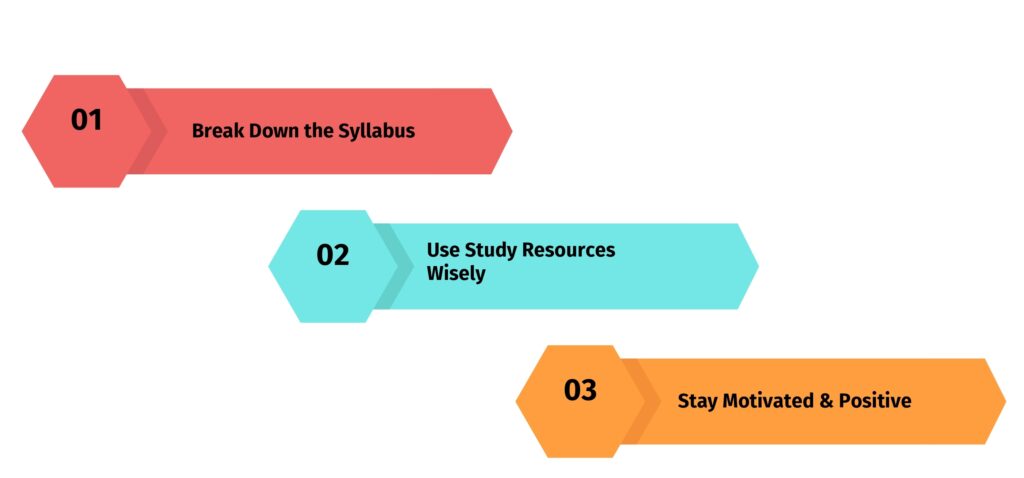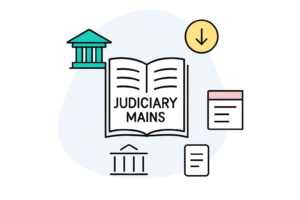The Judiciary Mains Examination is not just an exam; it’s your ticket to becoming a respected judicial officer and a guardian of justice. This challenging phase tests your legal acumen, analytical abilities, and decision-making skills through descriptive answers that demand precision, clarity, and depth.
In this guide, we’ll uncover everything you need to know to excel in the Judiciary Mains Exam. From acing your study plan to crafting perfect answers, let’s dive in!
What is the Judiciary Mains Exam?
An Overview
The Judiciary Mains Examination is the second, more challenging phase of the Lower Judiciary exam. After successfully clearing the Prelims, you now enter the world of subjective evaluation.
- The Mains test your ability to apply deep legal knowledge and articulate it clearly through well-drafted answers.
- It’s your chance to showcase your analytical thinking, writing skills, and comprehensive understanding of law.
The Mains Exam Syllabus & Pattern
Study Strategy
Each paper requires a deep dive into core subjects, including:
- Bare acts
- Landmark judgments
- Legal commentaries
To excel, it’s essential to understand the syllabus thoroughly and align your study strategy accordingly.
In-Depth Knowledge of Core Legal Subjects
Master the Essentials
A strong foundation in core legal subjects is your ultimate superpower!
- Immerse yourself in bare acts and key legal principles.
- Read landmark case laws carefully to deepen your understanding.
Success in the Judiciary Mains heavily relies on how well you master and apply the essentials of each subject.
Perfecting Your Answer Writing Skills

The Art of Writing Answers
Answer writing is an art you need to master. In the Judiciary Mains, clarity, precision, and structure are paramount.
- Structure your answers with clear headings and subheadings.
- Be concise and to the point.
- Highlight key legal principles and relevant landmark judgments.
Practice Regularly
Write answers regularly to refine your skills and build comfort with drafting under time constraints.
Time Management: The Key to Success
Why Time Management Matters
Effective time management is crucial for success in the Judiciary Mains Exam.
- The exam is time-bound, and with the vast syllabus, managing every minute wisely is essential.
Tips for Managing Time
- Practice with mock tests and previous year papers to simulate time pressure.
- Divide your time smartly between questions to ensure you attempt all of them.
With good time management skills, you can maximize your performance and leave no question unanswered.
Stay Updated with Case Laws and Recent Legal Developments
Stay Informed
The legal field is ever-evolving, with new case laws, judgments, and statutes being introduced regularly.
- Stay updated with the latest legal developments to enrich your answers with current examples.
Incorporate Current Knowledge
- Mention recent judgments and important case laws in your answers to show your awareness of the current legal landscape.
Mock Tests & Revision: Sharpening Your Sword
Importance of Mock Tests
Mock tests are a powerful tool to assess your preparation.
- Identify your strengths and weaknesses.
- Refine your answer-writing speed and accuracy.
Revision is Key
- Regularly revisit key concepts, case laws, and statutes to keep them fresh in your mind.
Smart Strategies for Maximum Impact

Break Down the Syllabus
Focus on high-weightage topics and prioritize concepts most likely to appear in the exam.
Use Study Resources Wisely
Leverage books, online lectures, and study materials from trusted sources to maximize your learning.
Stay Motivated & Positive
The Judiciary Mains is a marathon, not a sprint. Stay focused, keep your goals in sight, and tackle one step at a time.
Final Words of Encouragement

Your Moment to Shine
The Judiciary Mains is your opportunity to shine! Stay disciplined, focused, and dedicated throughout your preparation.
- Master the core subjects, practice answer writing, manage your time, and stay updated with legal developments. You’ll be ready to take on this challenge like a pro!
With Edzorb, You’re Ready for Success
With the right approach, resources, and consistent effort, you can ACE the Judiciary Mains with Edzorb Law and unlock your dream career in the legal world.
So, gear up, stay confident, and embark on this exciting journey toward becoming a judicial officer!

 Podcast
Podcast







 Features
Features






